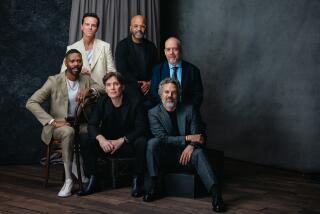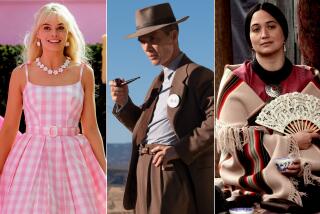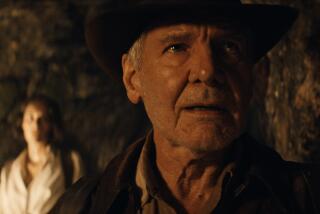Movie Reviews : ‘Signs of Life’ Falls Short of a Wonderful Idea
- Share via
“Signs of Life” (AMC Century 14), set in a small coastal Maine village, is deliberately shot with a jewel-like clarity that suggests the paintings of Andrew Wyeth: window curtains billowing in the morning breeze, hills and coastline icily distinct. Director John David Coles and cinematographer Elliot Davis turn the town into an objet d’art: precious, irreplaceable. But they also may want to suggest that sad clarity we get in the moments when something is irrevocably passing, leaving us forever.
The movie takes place on the last day of a local shipyard that has been defeated by modernity and fiberglass. The last boat is about to be launched; the boss (Arthur Kennedy) and his housekeeper (Kate Reid) muddle through the dust and detritus of decades; the foreman (Beau Bridges) awaits the birth of his fifth child while despondently mulling over chances of new employment; the two younger workers (Vincent Phillip D’Onofrio and Kevin J. O’Connor) are about to pull up stakes, to leave their loved ones--a retarded younger brother (Michael Lewis) and a girlfriend (Mary Louise Parker)--and head for Florida and an absurd dream of finding buried treasure.
Writer Mark Malone symbolically compresses the day’s events, which include a birth, a marriage and (maybe) a death. And, while Kennedy’s Owen Coughlin faces mortality, he is dogged by a beaming, spectral young man: the image of his long-dead father.
“Signs of Life” tries to portray a part of America most recent movies ignore: the old, the nonvictorious. But when Bridges’ foreman robs a store, he is the dispossessed outlaw: The wind blows the bills off his chest, like the gold dust in “Treasure of Sierra Madre.” And when D’Onofrio’s Daryl and O’Connor’s Eddie hit the road, they are enacting a goofball parody of thousands of highway quests from “Easy Rider” to “Rain Man.”
“Signs of Life” sounds like a wonderful movie. But, instead, it’s a wonderful idea. It has all the virtues we’ve come to expect of American Playhouse productions: artistic and social idealism, literacy, careful production, a sense of the landscape, fine acting--especially by Reid, Lewis and Arthur Kennedy, a great American actor too long absent from the screen. But Malone, like Chris Gerolmo in “Miles from Home,” comes from a more affluent milieu than his characters. He may unconsciously condescend to them--at best, turn them into vessels of poeticized guilt, at worst, into a passel of rustic nincompoops.
“Signs of Life” still has something precious to give us: those delicately etched, Wyethesque landscapes, the mood of melancholy community and generosity in the waning day, and Arthur Kennedy as Owen, raging, raging, against the dying of the light.
More to Read
Only good movies
Get the Indie Focus newsletter, Mark Olsen's weekly guide to the world of cinema.
You may occasionally receive promotional content from the Los Angeles Times.










